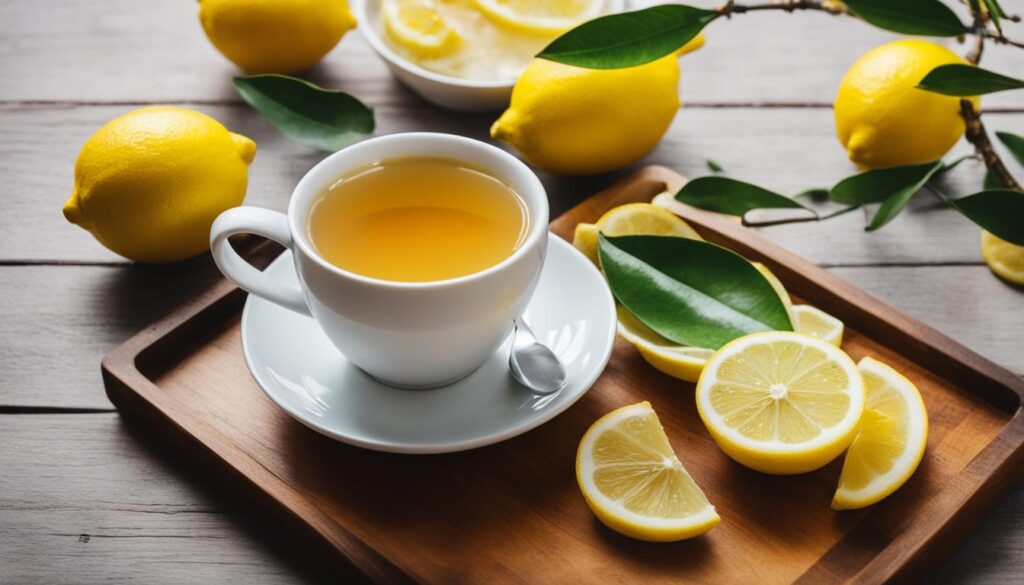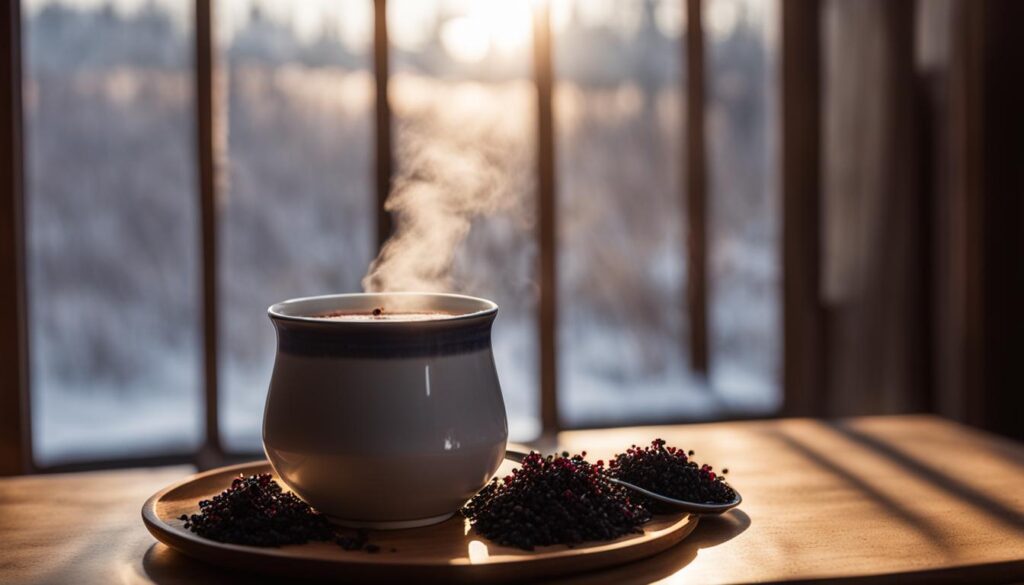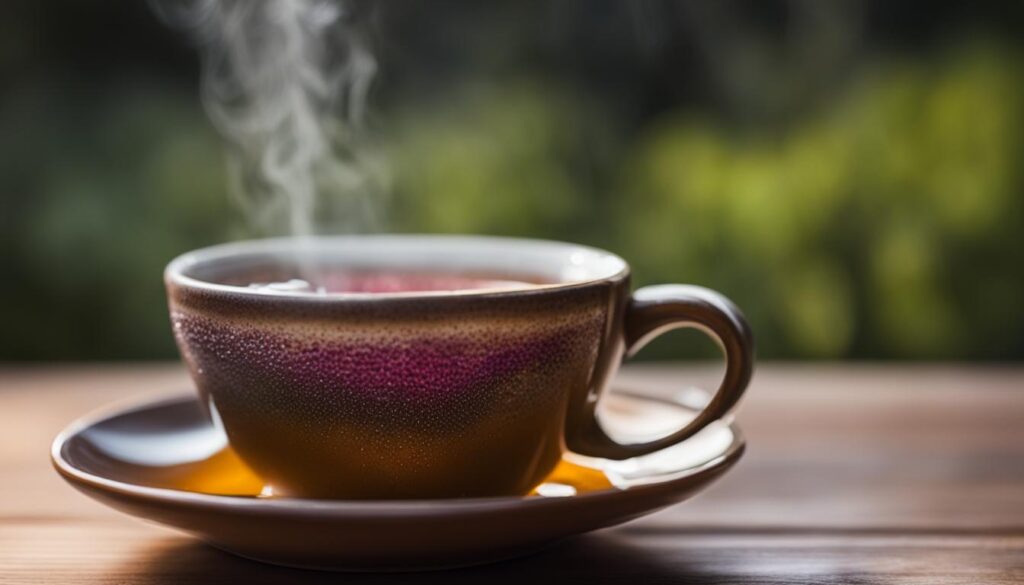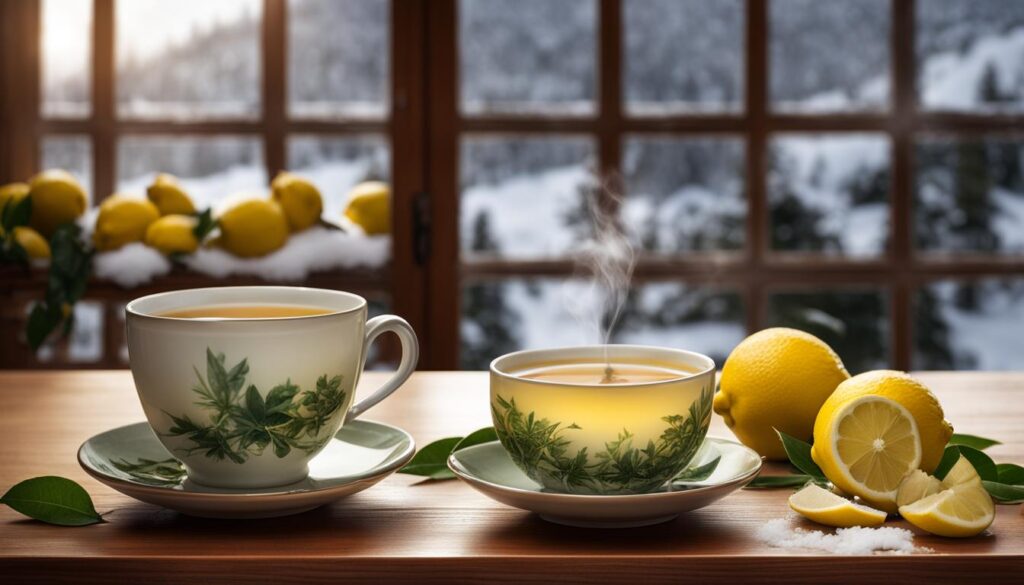When I’m fighting a cold, I know how important it is to find comfort and relief. That’s why I turn to soothing teas that not only help hydrate my body but also provide a sense of warmth and relaxation. While there’s no magic cure for a cold, certain herbal teas have properties that may help alleviate cold symptoms. In this article, I’ll introduce you to some of my favorite teas that can provide natural relief when you’re feeling under the weather.
Key Takeaways
- Lemon tea, rich in vitamin C, provides immune support and can soothe a sore throat.
- Elderberry tea has antiviral and antimicrobial properties that may help speed up recovery from the flu.
- Echinacea tea stimulates immune activity and may help shorten the duration of respiratory conditions.
- Green tea, with its high antioxidant content, provides immune support and boosts metabolism.
- Herbal tea with honey can help suppress coughing and soothe pain related to cold symptoms.
Lemon Tea for Cold Relief
Lemon tea is a popular home remedy for soothing a sore throat. While the evidence supporting its use is mostly anecdotal, lemons are a good source of vitamin C, an important nutrient for fighting colds and viruses.

Vitamin C is known for its immune-boosting properties, helping to strengthen the body’s defenses against illnesses. It can also provide relief to a sore throat by reducing inflammation and soothing discomfort.
To make a refreshing cup of lemon tea, simply squeeze the juice of half a lemon into a cup of hot water. You can add a teaspoon of honey to sweeten the taste and provide additional soothing benefits.
While lemon tea may not directly cure a cold, it can certainly help alleviate symptoms and provide temporary relief. Sipping on warm lemon tea can provide soothing comfort to a sore throat and promote hydration, which is essential for overall recovery.
Lemon Tea Benefits for Cold Relief:
- Soothes a sore throat
- Provides vitamin C to boost the immune system
- Offers temporary relief from cold symptoms
- Promotes hydration and overall well-being
So the next time you’re feeling under the weather with a sore throat, reach for a cup of lemon tea to help ease your discomfort and provide a comforting sensation.
| Lemon Tea Benefits | How It Helps |
|---|---|
| Soothes Sore Throat | Reduces inflammation and provides temporary relief |
| Boosts Immune System | Provides vitamin C to strengthen the body’s defenses |
| Hydrating | Promotes hydration for overall well-being and recovery |
Elderberry Tea for Cold Relief
Elderberry extract has long been believed to have properties that help with flu and cold recovery. Research suggests that elderberry has antiviral and antimicrobial properties, making it potentially effective in reducing the duration of flu symptoms.
However, it’s important to note that while there is evidence supporting elderberry’s antiviral effects against the flu, there is a lack of specific studies on the use of elderberry tea for treating colds. The existing research primarily focuses on elderberry’s benefits for the flu.
Antiviral Properties of Elderberry
Elderberry, scientifically known as Sambucus nigra, has gained attention for its potential antiviral properties. Studies have shown that elderberry extract can inhibit the replication of certain strains of influenza viruses, which may contribute to a shorter duration of flu symptoms.
Elderberry tea, with its potential antiviral properties, can be a comforting drink during the flu season. While it may not directly cure cold symptoms, it could potentially help alleviate flu symptoms. It’s important to consult with a healthcare professional before using elderberry tea for cold relief.
If you decide to try elderberry tea, it’s important to choose a high-quality, organic product to ensure its purity and safety. Follow the recommended dosage instructions and consider consulting with a healthcare provider, especially if you have underlying health conditions or are taking other medications.
As with any herbal remedy, elderberry tea may not be suitable for everyone. It’s essential to listen to your body and discontinue use if you experience any adverse reactions or allergies.
| Elderberry Tea for Cold Relief | Benefits |
|---|---|
| Contains antiviral and antimicrobial properties | May help reduce the duration of flu symptoms |
| Rich in antioxidants | Potential immune-boosting effects |
| May have anti-inflammatory properties | Could help soothe sore throat and nasal congestion |
| May support overall respiratory health | Promotes healthy respiratory function |
Disclaimer: It’s important to remember that elderberry tea is not a substitute for medical treatment, and it’s always best to seek professional medical advice for severe or persistent symptoms.

Echinacea Tea for Cold Relief
Echinacea tea is a popular choice for those seeking natural remedies to support their immune system during a cold. Known for its immune-stimulating properties, echinacea has become a go-to herb for many individuals looking to ease the symptoms and shorten the duration of respiratory conditions and the flu.
Although echinacea is widely consumed and admired for its potential health benefits, it’s important to note that the scientific research regarding its effectiveness in treating colds is still inconclusive. Some studies suggest that echinacea may indeed be beneficial in reducing the severity and duration of cold symptoms, thanks to its immune-boosting components. However, other studies have shown conflicting results, calling for further research and investigation.
One of the key factors that make echinacea tea a popular choice during a cold is its high antioxidant content. Antioxidants are compounds that help protect the body from free radicals, which are harmful molecules that can damage cells and weaken the immune system. By consuming echinacea tea, you can potentially benefit from these antioxidants, further enhancing your body’s natural defense mechanisms.
The Conflicting Research on Echinacea
“While echinacea is often praised for its immune-stimulating properties, there is still ongoing debate among researchers about its effectiveness in treating colds. Some studies suggest positive outcomes, while others show minimal to no effects. It’s important to consult with a healthcare professional before solely relying on echinacea tea as a cold remedy.”
Despite the conflicting research, many individuals find echinacea tea to be a comforting and soothing beverage during a cold. The act of sipping a warm cup of tea can provide a sense of relaxation and relief, while the potential immune-boosting properties of echinacea may offer additional support to the body during its healing process.
To make echinacea tea, simply steep the dried echinacea leaves or tea bags in hot water for about 5-10 minutes. You can also find ready-to-brew echinacea tea blends that combine echinacea with other herbs for enhanced flavor profiles.
It’s important to note that echinacea tea is not a cure for a common cold, but rather a complementary measure that can potentially provide some relief and support. If your cold symptoms persist or worsen after a few days, it’s always advisable to consult with a healthcare professional for a proper diagnosis and guidance on the most suitable course of treatment.

| Echinacea Tea Benefits | Echinacea Tea Considerations |
|---|---|
|
|
Green Tea for Cold Relief
Green tea is a popular beverage known for its refreshing taste and potential health benefits. It is rich in antioxidants, which help protect the body against damage from harmful free radicals. These antioxidants are beneficial for overall health and can support the immune system.
While more research is needed to determine the specific effects of green tea on cold relief, its immune-supporting properties make it a promising option for boosting your body’s defenses during illness.
The antioxidants found in green tea, such as epigallocatechin gallate (EGCG), have been associated with various health benefits, including enhancing immune function. They work to neutralize free radicals and reduce inflammation, which can contribute to symptoms of cold and flu.
In addition to its immune-supporting properties, green tea may also help boost metabolism. Some studies suggest that the catechins and caffeine in green tea can increase calorie burning and fat oxidation, which may be beneficial for maintaining a healthy weight while recovering from a cold.
Incorporating green tea into your daily routine can be a delicious and enjoyable way to support your immune system. While it’s not a magic cure for colds, its rich antioxidant content can provide important natural support during illness.
To enjoy the benefits of green tea, steep a teabag or loose tea leaves in hot water for a few minutes. You can drink it plain or add a squeeze of lemon juice for a burst of vitamin C. However, avoid adding sugar or honey, as these can potentially suppress the immune system’s response.
Remember, green tea is not a substitute for medical treatment, but it can complement your overall cold relief strategy by offering immune support.

Comparison of Green Tea and Other Herbal Teas for Cold Relief
| Tea Type | Antioxidant Content | Immune Support | Metabolism Boost |
|---|---|---|---|
| Green Tea | High | Yes | Yes |
| Lemon Tea | Low | Yes | No |
| Elderberry Tea | Moderate | Yes | No |
| Echinacea Tea | Low | Yes | No |
| Herbal Tea with Honey | Varies | Yes | No |
Herbal Tea with Honey for Cold Relief
When it comes to finding relief from cold symptoms, herbal tea with honey can be a soothing and comforting choice. Not only do these teas offer a range of flavors, but they also provide natural benefits that can help alleviate coughing, soothe pain, and provide relief from the discomfort of a cold.
Two popular options for herbal tea with honey are chamomile tea and peppermint tea. Chamomile tea is known for its calming properties and sweet, floral taste. It can help relax the body and mind, promoting a sense of well-being while also soothing sore throats. Peppermint tea, on the other hand, has a refreshing and invigorating flavor. It can help relieve congestion and clear nasal passages, making breathing easier during a cold.
So how does honey factor into the equation?
Honey has long been recognized for its many health benefits. It is widely known as an effective natural cough suppressant, providing relief from irritating coughs that often accompany a cold. When added to herbal tea, honey can help soothe a sore throat, suppress coughing, and reduce inflammation. Additionally, honey is believed to have antimicrobial properties that can help fight off infections and support the immune system.
By combining the goodness of herbal tea with the therapeutic properties of honey, you can create a powerful elixir to provide relief and comfort during a cold.
| Herbal Tea | Honey |
|---|---|
| Chamomile | Sweetens the tea and soothes a sore throat |
| Peppermint | Alleviates congestion and provides a refreshing taste |
| Echinacea | Boosts the immune system and helps relieve cold symptoms |
Remember: When using honey in herbal tea, it’s important to add it to warm, not boiling, water to ensure that its beneficial properties are preserved. You can also add a squeeze of lemon for an extra boost of vitamin C, which can further support your immune system.
So the next time you find yourself reaching for a comforting drink during a cold, consider sipping on a cup of herbal tea with honey. Not only will it provide a soothing and delicious beverage, but it may also help ease your cold symptoms and promote a faster recovery.
Other Home Remedies for Cold Relief
Aside from herbal teas, there are other effective home remedies that can provide relief during a cold. These remedies can help alleviate symptoms and promote a quicker recovery. Here are some tried-and-tested methods:
- Stay Hydrated: Hydration is crucial for overall health, especially when you’re battling a cold. Aim to drink 8 to 10 glasses of water or non-caffeinated fluids throughout the day. Staying hydrated can help thin mucus, soothe a sore throat, and flush out toxins.
- Zinc Supplements: Taking zinc supplements within 24 hours of experiencing cold symptoms may help reduce the duration of a cold. Zinc is known for its immune-boosting properties and has been shown to shorten the length of the common cold.
- Over-the-Counter Medications: Over-the-counter medications such as acetaminophen and ibuprofen can provide relief from symptoms like headache, aching joints, and fever. These medications help reduce pain and discomfort associated with colds.
- Cough Drops and Throat Lozenges: Cough drops and throat lozenges can help soothe a sore throat and promote saliva production. They provide temporary relief from coughing and help keep the throat moisturized.
Remember, these home remedies can complement traditional cold treatments but should not replace medical advice. If your symptoms persist for more than three weeks or worsen after ten days, it’s essential to consult a healthcare professional for further evaluation.
My Personal Experience:
Whenever I catch a cold, I make sure to incorporate these home remedies into my routine. Staying hydrated by drinking plenty of fluids helps me feel better and prevents dehydration. I also find that taking zinc supplements at the first sign of a cold shortens its duration. Over-the-counter medications, such as acetaminophen, help relieve my headaches and body aches. And of course, I always keep a stash of cough drops and throat lozenges nearby to ease my sore throat. These remedies have become my go-to solutions for finding relief during a cold.
By combining these home remedies with herbal teas, you can create a holistic approach to fighting your cold and recovering faster. Remember to listen to your body and give it the care it needs during this time.

Expert Tip:
“Home remedies like staying hydrated, using zinc supplements, and utilizing over-the-counter medications can provide relief from cold symptoms. Cough drops and throat lozenges help soothe a sore throat and promote saliva production. These remedies are easily accessible and can be effective in managing colds.” – Dr. Rachel Johnson, MD
When to See a Doctor for Cold Symptoms
While most colds are caused by viruses and can be managed at home with rest and over-the-counter remedies, there are certain instances where seeing a doctor is necessary. If your cold symptoms persist for more than 3 weeks or worsen after 10 days, it’s important to schedule an appointment.
There are certain red flags that may indicate a bacterial infection and require medical attention. If you experience pressure or pain around your forehead, have colored nasal discharge, or a high fever that persists for more than 24 hours, it’s crucial to consult a doctor. Additionally, if you have difficulty swallowing or breathing, or develop a deep, barking cough, seeking medical advice is recommended as these symptoms may be indicative of a more serious condition.
When it comes to your health, it’s always better to err on the side of caution. If you’re unsure whether your symptoms warrant a doctor’s visit, it’s best to reach out to your healthcare provider for guidance. Remember, they are there to help you make informed decisions and provide necessary treatment if needed.
FAQ
Is there a specific tea that can cure a cold?
While there is no scientific evidence that one specific tea can cure a cold, certain herbal teas have properties that may help alleviate cold symptoms.
What is the benefit of lemon tea for cold relief?
Lemon tea, rich in vitamin C, can be beneficial for the immune system and soothing for a sore throat.
Does elderberry tea help with cold recovery?
Research suggests that elderberry has antiviral and antimicrobial properties, which may speed up flu and cold recovery. However, specific studies on the use of elderberry tea for treating colds are limited.
What are the immune-stimulating properties of echinacea tea?
Echinacea tea stimulates immune activity and may help shorten the duration of respiratory conditions and the flu. However, the effectiveness of echinacea for colds is still debated, and further studies are needed.
How does green tea support cold relief?
Green tea provides antioxidants and immune support, although more research is necessary to determine its effectiveness in treating colds.
What is the benefit of herbal tea with honey for cold relief?
Herbal teas with honey, such as chamomile or peppermint tea, can be soothing for cold symptoms. Honey is known to be an effective cough suppressant and can help loosen phlegm, soothe pain, and suppress coughing.
Are there other home remedies for cold relief?
Staying hydrated with water or non-caffeinated fluids, taking zinc supplements within 24 hours of symptoms, using over-the-counter medications like acetaminophen and ibuprofen, and consuming cough drops or throat lozenges can also be helpful during a cold.
When should I see a doctor for cold symptoms?
It’s important to see a doctor if cold symptoms persist for more than 3 weeks or worsen after 10 days. Severe symptoms like pressure or pain around the forehead, colored nasal discharge, high fever persisting for more than 24 hours, difficulty swallowing or breathing, and a deep, barking cough may indicate a bacterial infection that needs medical attention.